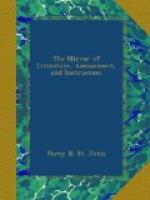I hastened to the Place of St. Mark. It was crowded and illuminated. Three gorgeous flags waved on the mighty staffs, which are opposite the church in all the old drawings, and which once bore the standards of Candia and Cyprus, and the Morea. The coffee-houses were full, and gay parties, seated on chairs in the open air, listened to the music of military bands, while they refreshed themselves with confectionary so rich and fanciful, that it excites the admiration, and the wonder of all travellers, but which I have since discovered in Turkey to be Oriental. The variety of costume was also great. The dress of the lower orders in Venice is still unchanged: many of the middle classes yet wear the cap and cloak. The Hungarian and the German military, and the bearded Jew, with his black velvet cap and flowing robes, are observed with curiosity. A few days also before my arrival, the Austrian squadron had carried into Venice a Turkish ship and two Greek vessels which had violated the neutrality. Their crews now mingled with the crowd. I beheld, for the first time, the haughty and turbaned Ottoman, sitting cross-legged on his carpet under a colonnade, sipping his coffee and smoking a long chiboque, and the Greeks, with their small red caps, their high foreheads, and arched eyebrows.
Can this be modern Venice, I thought? Can this be the silent, and gloomy, and decaying city, over whose dishonourable misery I have so often wept? Could it ever have been more enchanting? Are not these indeed still subjects of a Doge, and still the bridegroom of the ocean? Alas! the brilliant scene was as unusual as unexpected, and was accounted for by its being the feast day of a favourite saint. Nevertheless, I rejoiced at the unaccustomed appearance of the city at my entrance, and still I recall with pleasure the delusive moments, when strolling about the place of St. Mark the first evening that I was in Venice, I for a moment mingled in a scene that reminded me of her lost light-heartedness, and of that unrivalled gaiety that so long captivated polished Europe.
* * * * *
SWISS LEGEND OF WILLIAM TELL.
The famous episode of William Tell, was momentous to the main plot of the emancipation of Switzerland in its issue. This man, who was one of the sworn at Rutli, and noted for his high and daring spirit, exposed himself to arrest by Gessler’s myrmidons, for passing the hut without making obeisance. Whispers of conspiracy had already reached the vogt, and he expected to extract some farther evidence from Tell on the subject. Offended by the man’s obstinate silence, he gave loose to his tyrannical humour, and knowing that Tell was a good archer, commanded him to shoot from a great distance at an apple on the head of his child. God, says an old chronicler, was with him; and the vogt, who had not expected such a specimen of skill and fortune, now cast about for new ways to entrap the object of his malice; and,




